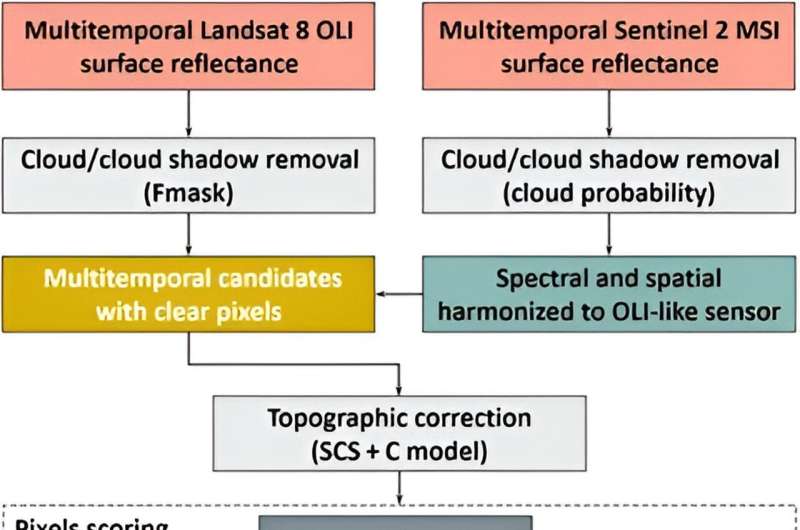
In a study published in the Journal of Remote Sensing on 28 September 2023, a team of researchers from the Chinese Academy of Forestry and the University of Maryland has developed a sophisticated Multifactor Weighting (MFW) method for creating clear, seamless, and radiometrically consistent image composites using all available Landsat 8 and Sentinel 2 images in Google Earth Engine.
The MFW method developed by the team integrates multiple factors, including acquisition day of the year (DOY), proximity to cloud or cloud shadow, and haze impact, to calculate a composite score for each pixel. This score is then used to weight observations, ensuring a more seamless integration of imagery from different dates and conditions.
The method was rigorously tested across four distinct climate zones in China and demonstrated superior consistency and visual quality compared to traditional Best Available Pixel (BAP) methods. It effectively mitigates issues like artificial patchiness and enhances the overall quality of the composite images.
Lead researcher, Dr. Shili Meng, remarked, “The MFW method represents a quantum leap in satellite image processing. It not only addresses common discontinuities found in composite images but also significantly enhances the spatial and radiometric consistency of the imagery, paving the way for more accurate global monitoring.”
The team aims to further refine the MFW method and expand its application to other regions and types of satellite data. They acknowledge challenges such as improving cloud masking algorithms and adapting the method to handle the ever-increasing volume and variety of remote sensing data. Continuous enhancements and community collaboration will be critical in overcoming these challenges and realizing the full potential of the MFW method.
This new method has significant implications for various fields relying on remote sensing data, including environmental monitoring, climate change studies, disaster response, and agricultural planning. By providing clearer, more consistent composite images, the MFW method can greatly enhance the accuracy of observations and the decision-making processes based on this data.
More information:
Shili Meng et al, A Multifactor Weighting Method for Improved Clear View Compositing Using All Available Landsat 8 and Sentinel 2 Images in Google Earth Engine, Journal of Remote Sensing (2023). DOI: 10.34133/remotesensing.0086
Citation:
Multifactor weighting method for enhanced composite images (2024, January 4)
retrieved 5 January 2024
from https://phys.org/news/2024-01-multifactor-weighting-method-composite-images.html
This document is subject to copyright. Apart from any fair dealing for the purpose of private study or research, no
part may be reproduced without the written permission. The content is provided for information purposes only.

